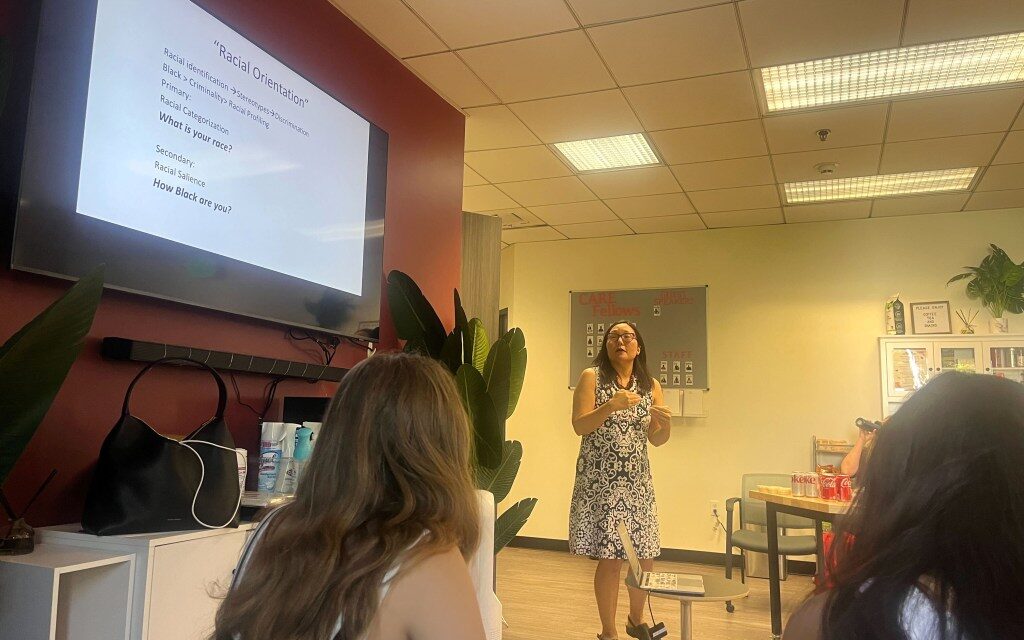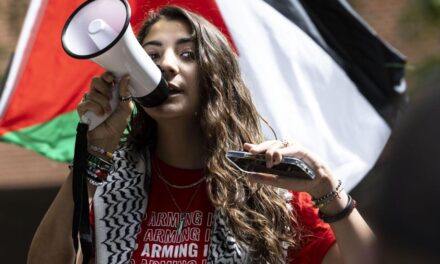
 On Tuesday, Oct. 8th, Claremont McKenna College hosted a talk, “Mixed and Multiracial: Race, Gender, and Power,” given by Lynn Itagaki, associate professor of literature and gender, in the first of a three-part lunch talk series. (Ellie Lakatos • The Student Life)
On Tuesday, Oct. 8th, Claremont McKenna College hosted a talk, “Mixed and Multiracial: Race, Gender, and Power,” given by Lynn Itagaki, associate professor of literature and gender, in the first of a three-part lunch talk series. (Ellie Lakatos • The Student Life)
On Tuesday, Oct. 8, Claremont McKenna College’s (CMC) Gender and Sexuality Studies Department invited Lynn Itagaki, associate professor of literature and gender at CMC, as part of their “Gender and the Elections” lunch series. This talk, “Mixed and Multiracial: Race, Gender, and Power,” was the first in a three-part series and took place at the CARE Center at CMC.
One of the organizers, Diana Selig, associate professor of history at CMC, commented on why the talk series was created.
“We organized the lunch series on gender and the elections in order to spark discussion on important and timely topics,” Selig said in an email to TSL. “We aim to provide opportunities to think about how dynamics of gender and race can help us understand the current election.”
The talk opened with an introduction of Itagaki as a scholar of many disciplines including literature, cultural studies, race and ethnicity, gender works on women of color, feminism and gender studies and comparative race studies.
Itagaki spoke on gender and the election in regard to presidential candidate and current vice president Kamala Harris. Itagaki later tied the conversation back to the subject by citing heavily criticized comments made by Donald Trump about Harris’ identity during an August interview at the Chicago National Association of Black Journalists Conference.
“She was Indian all the way, and then all of the sudden she made a turn, and she went — she became a black person,” Trump said.
Itagaki then spoke about how race in the census used to be determined.
“We had until 1950 that people who are census takers would look at you and be like ‘You’re that identity,’” Itagaki said. “Whether or not you agreed. It didn’t matter.”
After diving further into United States history, Itagaki remarked on the significance of such a discussion.
“We hear this history of genocide, we hear this history of dispossession, and we hear this history of unfreedom, right and enslavement in the creation of property, in the creation of racial categories,” Itagaki said. “And so the sense of, I don’t know you, I know you, or I need to know you, has this kind of legacy that is really part of American history that people don’t want to think about.”
Itagaki continued her talk with a question on intersectionality and its use. She mentioned Michael Dawson, a political scientist in the 1990s, and his work “Behind the Mule,” which discussed African American voting out of the Civil Rights era.
Itagaki then discussed the concept of “linked faith,” or how voting is tied to group identity or faith, looking at Harris’ campaign as an example.
“It makes sense why Harris would try to activate this voting population and why her opponents would try to make this activation disingenuous, like she’s not Black enough, because of this linked faith,” Itagaki said.
Itagaki continued by asking the audience to discuss intersectionality and incited a conversation that allowed students to share their own experiences of being multiracial. She concluded by connecting racial identity to the larger United States.
“We have this legacy of the past to the present day,” Itagaki said.
Chloe Ray, assistant director of the writing center at CMC, and audience member spoke on the new perspective she gained from the talk.
“Seeing these moves to use race in this way or to make people trust because of multiraciality, I didn’t think about it in that way,” Ray said. “That [was] really clever to do that.”
Ray also said she noticed the impact the talk had on broadening people’s views on identity.
“Usually identities are acknowledged in a kind of monoracial or kind of not an intersectional way, so it’s nice to see this intersectional identity brought up, and to see students chiming in, excited to share and people who are monoracial to be interested to learn,” Ray said.



